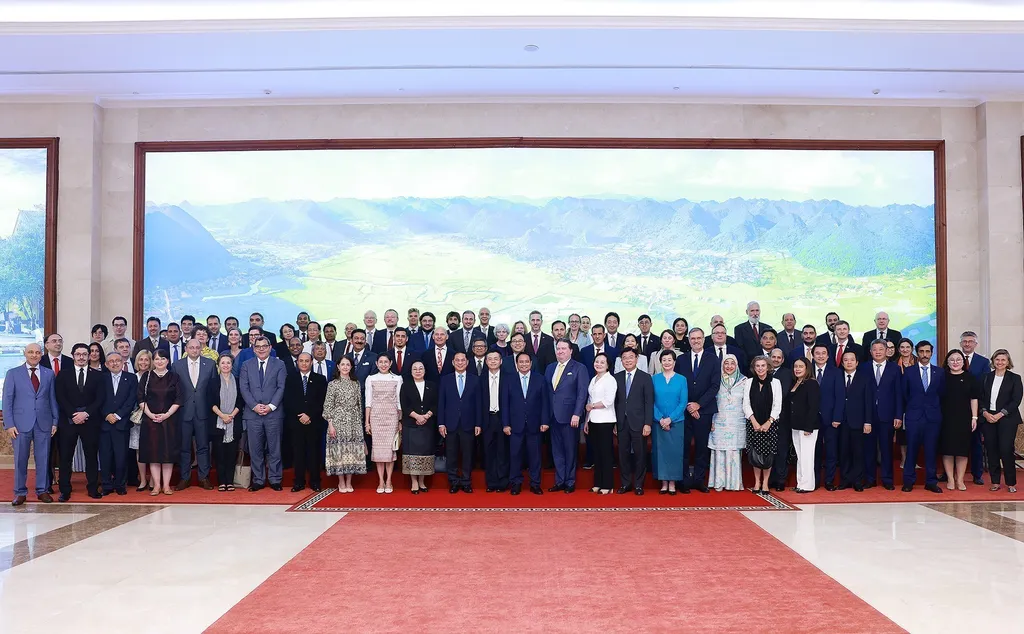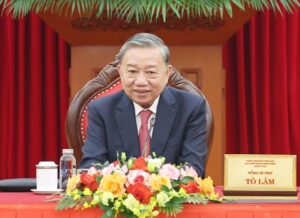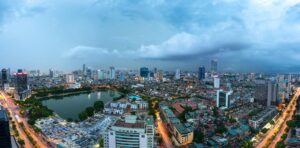Vietnam Briefs Diplomatic Corps on Governance Reforms and Development Vision

Hanoi, The Gulf Observer: Prime Minister Phạm Minh Chính on Thursday convened a high-level meeting with ambassadors, chargés d’affaires, and representatives of international organisations in Vietnam to provide a comprehensive briefing on the country’s ongoing administrative reorganisation and the restructuring of its two-tier local government system.
Addressing the diplomatic corps in Hanoi, Prime Minister Chính extended his gratitude for their continued support, cooperation, and friendship towards Vietnam, particularly amid the country’s ambitious transformation agenda.
Drawing on the legacy of Việt Nam’s 40-year Đổi mới (renewal) process, the Prime Minister reiterated the national aspiration to become an upper middle-income country with a modern industrial base by 2030 and a high-income developed nation by 2045.
He underscored that achieving these goals requires innovative thinking and decisive action, anchored on three strategic pillars: socialist democracy, a socialist rule-of-law state, and a socialist-oriented market economy. “People are the centre, the subject, the motivation, and the resource for development,” he emphasised.
Economic development remains a central task, the Prime Minister said, noting that Việt Nam seeks to build an independent and self-reliant economy that is actively and effectively integrated into the global economy. The nation continues to pursue an independent foreign policy based on multilateralism, diversification, and being a reliable partner and responsible member of the international community. He reaffirmed Việt Nam’s commitment to its “four no’s” defence policy: no military alliances, no siding with one country against another, no foreign military bases or use of its territory to oppose other countries, and no use of force or threat of force in international relations.
The Prime Minister also highlighted Vietnam’s firm commitment to social justice, inclusivity, and welfare, vowing to leave no one behind. He stressed the importance of strengthening the Communist Party and political system while intensifying the fight against corruption and negative practices.
Despite facing numerous global challenges, Vietnam has recorded notable socio-economic progress. The macroeconomy remains stable, inflation is under control, fiscal indicators are sound, and living standards have improved. Particularly notable, the Prime Minister said, is that Vietnam’s happiness index has climbed by 33 places.
He further noted that since the beginning of 2025, the government has been pursuing what he called a “revolution in organisational structure,” shifting from a reactive to a proactive, service-oriented administration. This transition is underpinned by four strategic pillars: science and technology, innovation and digital transformation; international integration; institutional reform and legal enforcement; and private sector development. Upcoming policy reforms will also focus on education, healthcare, and cultural affairs.
Prime Minister Chính called on the international community to continue its support and cooperation, describing foreign diplomats and representatives as crucial bridges linking Vietnam with the global community. He praised their valuable contributions to shared objectives of peace, prosperity, and sustainable development.
Speaking on behalf of the diplomatic corps, Moroccan Ambassador Jamale Chouaibi, Deputy Head of Mission, commended Vietnam’s efforts to streamline its governance structure and modernise public administration. He noted that Vietnam’s socio-economic achievements are a testament to the effectiveness of its strategic vision and expressed confidence that ongoing reforms will bolster Vietnam’s position in global rankings across sustainable development, economic freedom, and innovation.
Ambassador Chouaibi affirmed that Vietnam’s reforms would not only improve the lives of its people but also create significant opportunities for international businesses and organisations. He assured that the diplomatic corps will continue to support Vietnam in its journey toward becoming a high-income developed country by 2045.
Other attending diplomats and representatives echoed similar sentiments, expressing keen interest in enhancing cooperation with Vietnam in areas such as green growth, administrative reform, human resource development, social welfare, and public service delivery.


